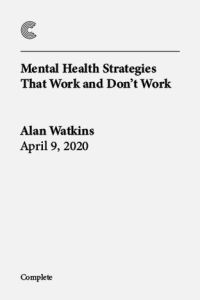Join getAbstract to access the summary!

Join getAbstract to access the summary!
Alan Watkins and Katie Ledger
Mental Health Strategies That Work and Don’t Work
Complete Webinars, 2020
What's inside?
Emotional control can be the source of great confidence.
Recommendation
You can see people’s behavior, performance and results, but what’s going on below the surface? According to physician and neuroscientist Alan Watkins, thoughts influence behavior, feelings influence thoughts, emotions influence feelings and physiology influences emotions. To succeed at the top levels, you must master the levels below. Luckily, Watkins has some immediately applicable tips on how to regulate your physiology and shift your emotional state – just in time to combat those COVID-19 blues.
Summary
About the Speakers
Physician and neuroscientist Alan Watkins is the CEO and founder of Complete Coherence, a professional training and leadership coaching company. Host Katie Ledger is a former journalist for the BBC. She now coaches leaders and speakers at Complete Coherence.






















Comment on this summary